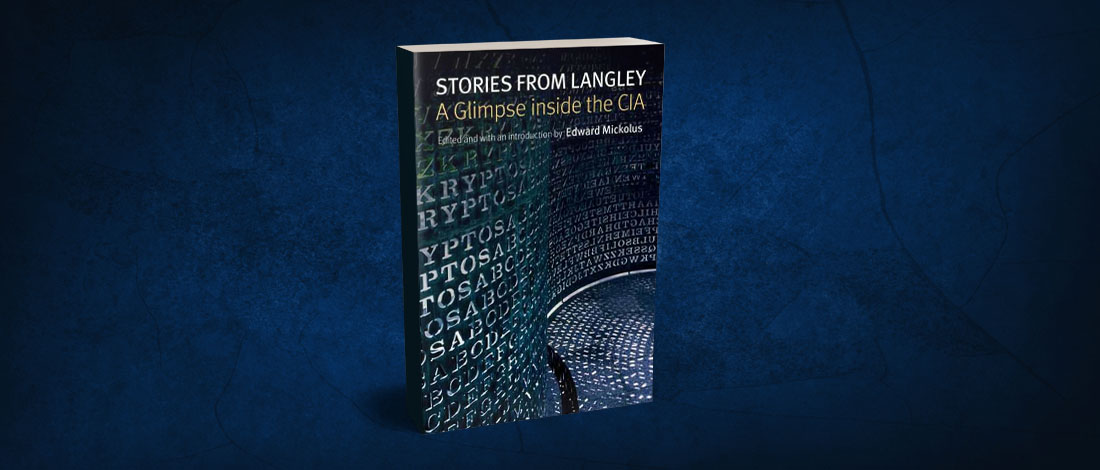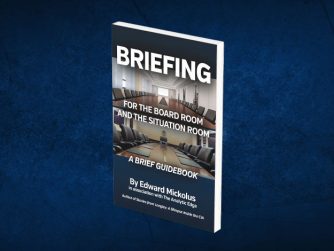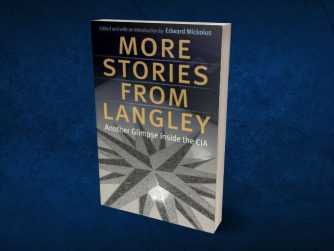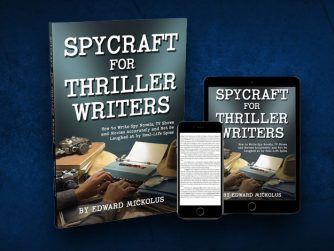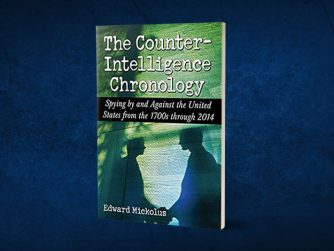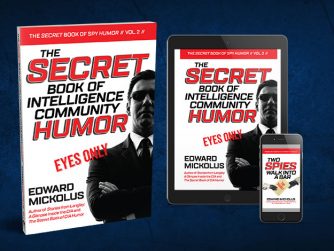Applicants to the Central Intelligence Agency often asked Edward Mickolus what they might expect in a career there. Mickolus, a former CIA intelligence officer whose duties also included recruiting and public affairs, never had a simple answer. If applicants were considering a life in the National Clandestine Service, the answer was easy.
Numerous memoirs show the lives of operations officers collecting secret intelligence overseas, conducting counterintelligence investigations, and running covert action programs. But the CIA isn’t only about case officers in far-flung areas of the world, recruiting spies to steal secrets. For an applicant considering a career as an analyst, a support officer, a scientist, or even a secretary, few sources provide reliable insight into what a more typical career at the CIA might look like.
This collection of the exploits and insights of twenty-nine everyday agency employees is Mickolus’s answer. From individuals who have served at the highest levels of the agency to young officers just beginning their careers, Stories from Langley reveals the breadth of career opportunities available at the CIA and offers advice from agency officers themselves.
- Title : Stories from Langley: A Glimpse Inside the CIA
- Authors : Edward Mickolus
- Publisher : Potomac Books
- Publication Date : December 15, 2014
- Language : English
- Hardcover : 408 pages
- ISBN-10 : 161234688X
- ISBN-13 : 978-1612346885
- Item Weight : 1.65 pounds
- Dimensions : 6.01 x 1.43 x 9.34 inches
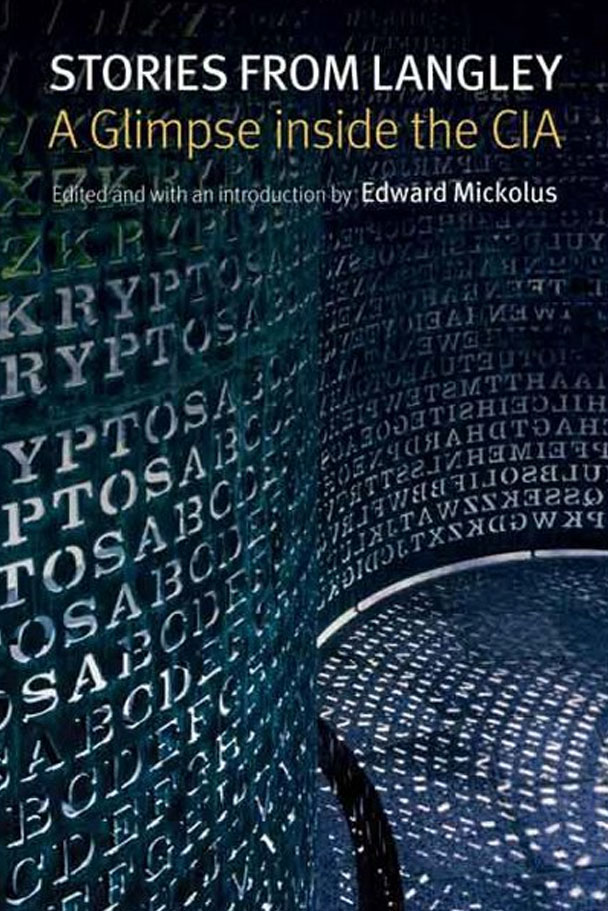
Upon its release, it was #26 in Biographies & Memoirs/True Crime/Espionage; #56 in Politics & Social Sciences/Politics & Government/Specific Topics/Intelligence & Espionage; and # 36,106 in books overall on Amazon.com rankings.
Mentioned in “Celebrations” Florida Writers Association The Florida Writer February 2015, p. 30.
Reviews
“Stories from Langley provides an invaluable behind-the-scenes look at professional life inside the CIA. While many have written about great operational exploits, few have focused on the daily lives and challenges of analysts, support officers, and engineers, members of the organization whose work is as essential if not as glamorous in the public eye. Young men and women wondering about what to expect in these varied CIA careers will find the book fascinating, revealing, and perhaps even enticing.”—George Tenet, former director of Central Intelligence for the CIA
“One of the most difficult aspects of intelligence is trying to convey to outsiders what that life—especially as an analyst—is really like. Most fiction is overblown and inevitably focuses on operations and spying. Stories from Langley is a delightful foray into the actual experiences of a broad range of intelligence officers and fills an important gap in our intelligence literature. Anyone interested in the nuts and bolts of an intelligence career will find this a useful and worthwhile read.”—Mark Lowenthal, former assistant director of Central Intelligence for Analysis & Production for the CIA and author of Intelligence: From Secrets to Policy
5 Stars: Excellent book. Many books, both accurate and inaccurate, have been written about the Operational aide of the CIA but very little, if any, have focused on the analytical side. All of the clandestine material collected would be worthless unless an analyst painstakingly brought all source information together to craft a finished product, which, hopefully, proves useful to the policy maker. This book describes the analytical process in great detail with many interesting stories by the individual authors. –An Amazon customer
Table of Contents
Introduction
Abbreviations
Part 1: Speaking Truth to Power: CIA Intelligence Analysts
Getting In: Why Join the Directorate of Intelligence?
Volko Ruhnke Careers in Intelligence Analysis
Martin Petersen The Best Speech I Ever Gave, The Best Thing I Ever Wrote
Briefing the President
John Hollister Hedley Working with Words and Enjoying the View
Henry Appelbaum Never Boring, Often Meaningful, and Almost Fun
John Helgerson Briefing Presidential Candidates
Monitoring Soviet Military Capabilities
Michael D. Flint, Boyd Sutton, and Tony Williams The Soviets Go on the LAMM
Michael D. Flint Making the World Safe through SAFE
Tony Williams Getting the Facts Right
Winning the Cold War
Robert Leggett An Economist’s Look at the Soviet Union, and Beyond
Robert Blackwell Two of the “Coolest” Things I Did Working for the CIA
Anne Gruner A Cold War CIA Analyst Remembers
A Wealth of Options
Nicholas Starr Reminiscences of a Checkered Past
Alan More Reflections on an Eclectic CIA Career
Will Rogers A Geographer Looks Back at 50 Years with CIA
Jon Nowick An “Out of Body Experience”: Seeing the DI with New Eyes
Edward Mickolus Peasant at the Creation: The Agency’s First Terrorism Analyst and Beyond
Dealing with The Rest of the World
Tom Sheridan Satellite Imagery and the Afghan Task Force
Jeri DiGiulio Slideshow
Merrilly Baird Meanwhile, in Asia…
Part 2: Heroes Behind the Heroes: CIA Support Officers
A Quick Look at Oversight
Marty Petersen On Planet Congress
Dan King In Support, You Never Know Where You Might End Up—And What You Might Learn Along the Way
Dan King What is a Promise Worth?
Robert A. Morgan, Jr. An Adventure in the Far East
Hugh S. Pettis First Tour Adventures: The Mysterious Case of the Missing Missionary
Hazel Harrison Out of the Barn, Into the Beltway
Martin Petersen Ed and a Secretary: How I Ended Up at the CIA
Frank Ryan Traveling with the President
Richard Irwin KH601
A Hero’s Story
Wally Szuminski Our Man in Havana’s Jails: TDY in Hell
A Word From Our Predecessors
John Behling Operation Oshima
And From the Next Generation
Scott Schlimmer The Other Side of the CIA: My Life as a CIA Analyst
Appendix: The Vision, Mission, and Values Statement of the Central Intelligence Agency
Suggested Reading
Contributors
——————
Introduction
During the three years in the mid-2000s during which I served as a recruiter for the Agency, I was often asked by would-be applicants, “OK, I sort of get what I’d be doing. But what would I have to show for a career?” The answer for those considering a life in the National Clandestine Service was easy: just read the memoirs of such heroes as Allen Dulles, Richard Helms, William Colby, Gary Schroen, Richard Holm, Duane Clarridge, David Phillips, James Olson, Floyd Paseman, and countless others. In those pages, aspiring operations officers, collection management officers, staff operations officers, and targeters could learn of the multitude of experiences available to those who collect secret intelligence overseas, conduct counterintelligence investigations, and run covert action programs. But there was no easy answer for those considering a career as an analyst, support officer, tech officer, or a myriad of other roles. There have been a handful of books about how to run the Directorate of Intelligence, most notably by former Deputy Director of Intelligence R. Jack Smith and former Secretary of Defense Robert Gates (himself a former DDI), but nothing on what a more typical career looks like.
I could tell them about my career, which included serving in analytical, operational, management, and staff positions in four Directorates of the Central Intelligence Agency for 33 years involving high profile, complex, and diverse functions and disciplines, including being the CIA’s first full-time analyst on international terrorism; analyzing African political, economic, social, military, and leadership issues; writing political-psychological assessments of world leaders; traveling to a score of countries in Europe, Latin America, Africa, Asia, and the Middle East; managing collection, counterintelligence, and covert action programs against terrorists, drug traffickers, weapons proliferators, and hostile espionage services; lauding the achievements of America’s silent heroes in the internal newsletter; designing major cross-directorate programs and CIA-wide events; testifying on the Hill; and recruiting, mentoring, and teaching scores of CIA’s next generation of leaders. While this sounds like a wide-ranging career, it’s not uncommon at the Agency. But how could I get potential applicants to understand that? Asking them to take my word for it was not enough.
I raised this issue with a lunch partner, a brilliant 24-year-old chemist already on the fast track in the DI. She suggested that while no analyst has had time or inclination to write a 300-page manuscript—who wants to write after a hard day of writing President’s Daily Briefs?—I might be able to ask friends from my generation to write a few pages. She, in turn, could poll her newly-arriving friends regarding what they are experiencing—level of responsibility even at a comparatively tender age, depth of training, etc. Getting their input would make the collection more relevant to today’s Generation Y members looking for something challenging and worthy of their abilities.
So I sent out the following note via several Agency and Intelligence Community listservs and newsletters:
Your Help is Needed on DI-DS Mini-Memoirs Book Projects
I’ve frequently been asked while recruiting for the Agency “What’s it like to work there? What will I do?” When these issues are raised by would-be NCS officers, I can easily point them to a truckload of DO memoirs. But there’s nothing comparable to that for the DI or DS-DA. There are some excellent how-to-do-analysis books (e.g., Heuer; Bruce & George; Westerfield’s Studies in Intelligence compilation), but no true memoirs (Gates’s From the Shadows is more on how to be a DCI rather than what he did as an analyst). There are some from the DS, but those few do not give the reader an appreciation of the breadth of opportunities available in the Directorate, much less the Agency and the Intelligence Community as a whole. Alas, few of us have the time to write a 300-page memoir. But many of us have great war stories that can be told on the unclassified level for, say, 5-10 pages. (So I’ve discovered in putting together the separate Agency humor book. Thanks to everyone who has contributed and for those who haven’t—there’s still time!) So a currently serving analyst and I are compiling a collection of circa 25-30 mini-memoirs that will serve as a book that would-be DI analysts can read before applying. I’m separately compiling the same type of book for would-be Support officers. Contributors don’t have to have had a career solely or even preponderantly in one of those Directorates. We’re just looking for short essays that can cover such things as:
- the coolest thing you ever did as a member of the Directorate
- the breadth of jobs you held in your Agency career that involved DI and/or DS skills
- positions you held or experiences you had that were radically different from what you expected based on your first DI and/or DS position, but that used the skills you had and/or developed within the Agency
I’ve asked the current Directors of Intelligence and Support, respectively, for introductions (and, perhaps, their mini-memoirs as well). Several publishing houses have expressed interest in these projects.
So, here’s the formal plea to you. You have had a great career, and have great experiences that you can share. Could you provide a 5-10 page piece by September 30, 2009 (the end of the fiscal year has a nice ring to it.)? I’d be delighted to have you participate in one or both of these projects…
The response was heartening. Many former and current officers came forward to praise the idea, still others to suggest colleagues who had great stories, and a few others who actually wrote something. Contributors came from all levels of the Agency. Some had served as leaders of the Directorates of Intelligence and Support, some at even more senior levels of the Agency. Others had toiled in several other Agency directorates and other federal agencies. Still others were internationally-renowned experts in their substantive fields. Some had invented pathbreaking methods of analysis. Others had shown rare personal and physical courage under extreme stress. Still others were at the beginning or middle of their careers, wondering how their experiences will one day stack up to those described herein.
This has been a labor of love for the many contributors to this edition. Many who had left the Agency decades earlier wrote back to offer their memories and best wishes for those who might follow in their footsteps. Many had to beg off because they remained under cover—yes, some analysts, techs, and support team members are covert—or the topics on which they wrote still remain too sensitive to talk about in public. Others modestly wondered whether their stories were compelling enough to merit inclusion (they were).
You hold in your hands the final result of our work. It has been written, as is most everything else in the Agency, by a committee of individuals working together on what they love. One particularly moving note read: “I cannot thank you enough for giving me this opportunity….having reflected back on my career more than a decade after it ended made me fully realize how very blessed I was, and it will be wonderful, once you have security clearance for all our pieces, to be able to share it with family and friends.” This is a place where people truly love to work, and it shows in their writing.
In addition to the contributors, I’d like to thank the many Agency officers, currently serving as well as alumni, who provided leads to authors, ideas for articles, and overall best wishes. Alas, cover and personal security considerations prevent me from naming them, but they know who they are, and the country will always be in their debt.
My answer to the applicants? “Look around at all of the opportunities you have in the public and private sector. At the end of your career, would anyone want to read your memoirs?” Thanks for reading those contained in this book.

